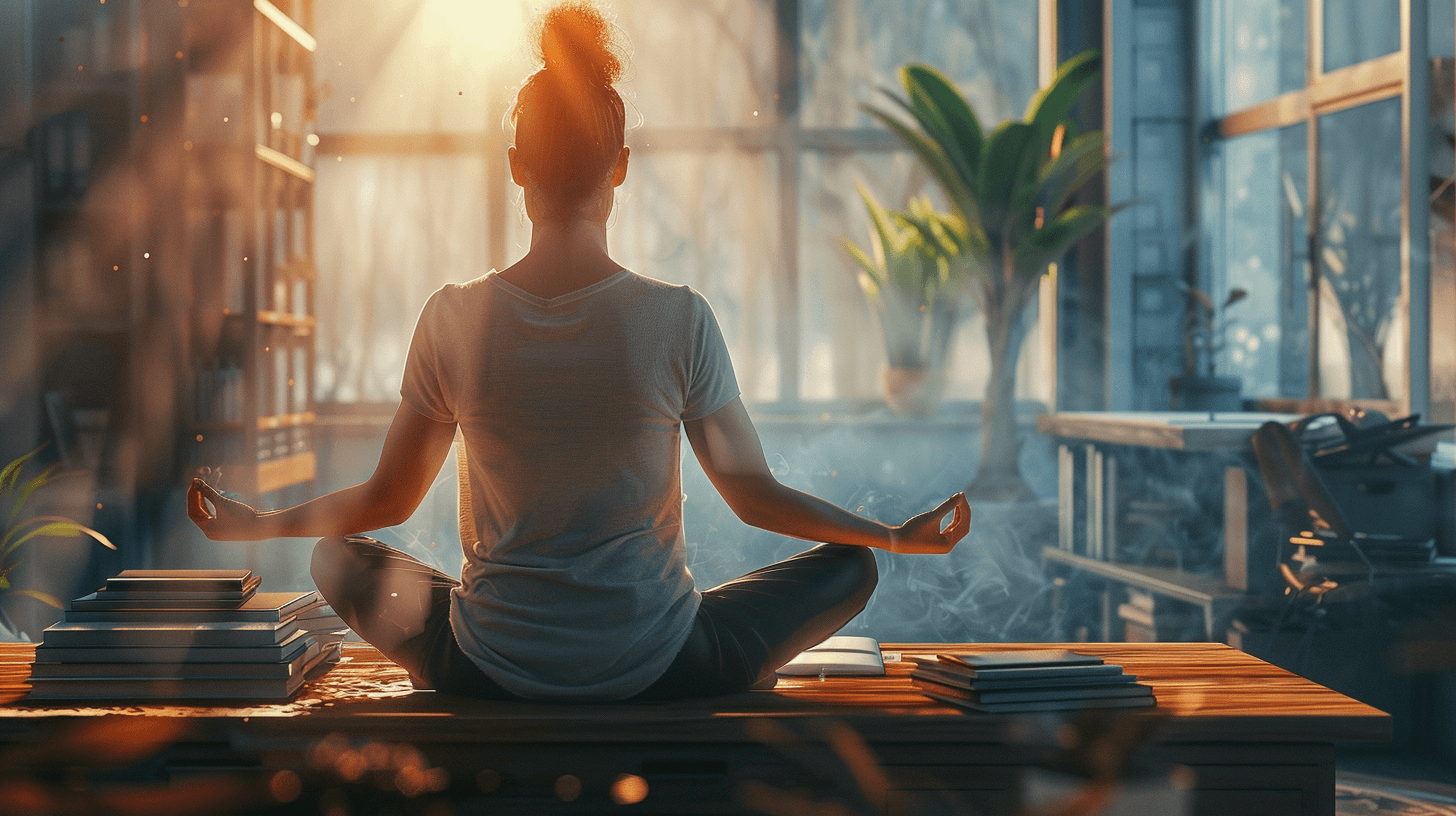Introduction

Stress has become a defining challenge of modern life, affecting people across all demographics. From demanding careers to personal responsibilities, many find themselves trapped in a cycle of tension, anxiety, and burnout. While traditional stress management techniques offer some relief, they often fail to address the root causes or provide a comprehensive approach.
This is where holistic meditation programs for stress reduction come into play. These programs go beyond simple mindfulness or breathing exercises, integrating physical, mental, and spiritual practices to create lasting calm and balance. With their focus on the whole person, they address stress on every level, offering a transformative path to peace of mind.
Let’s dive deeper into what makes holistic meditation so effective and explore its role in combating stress.
What Is Holistic Meditation?

Holistic meditation is a multifaceted approach to stress relief that incorporates elements of mindfulness, physical relaxation, emotional regulation, and spiritual connection. Unlike traditional methods that may focus solely on one aspect—such as breathing or visualization—holistic meditation integrates various practices to provide a comprehensive experience. By addressing the mind, body, and spirit, it ensures that no part of your well-being is overlooked.
How Does Holistic Meditation Differ from Traditional Practices?
While traditional meditation often focuses on singular techniques like mindfulness or chanting, holistic meditation takes a more inclusive approach. For example:
- A traditional mindfulness practice may teach you to observe your thoughts without judgment.
- A holistic meditation program, however, might combine mindfulness with breathing techniques, yoga, and guided visualizations to create a layered and impactful experience.
The Science Behind Holistic Meditation
Numerous studies have confirmed the efficacy of meditation in reducing stress. For instance, research from the American Psychological Association highlights that consistent meditation practice lowers cortisol levels—the hormone most associated with stress. Holistic meditation amplifies these benefits by offering a variety of techniques tailored to individual needs, making it easier for participants to find methods that resonate with them.
Key Elements of Holistic Meditation Programs

Holistic meditation programs incorporate a range of techniques that work synergistically to reduce stress. Here are the core elements:
Mindfulness Techniques
Mindfulness is at the heart of most holistic programs. It involves staying present and fully engaged in the moment, helping to quiet the mental chatter that often accompanies stress. Common mindfulness exercises include:
Body Scan Meditation: A guided practice where you focus on each part of your body, releasing tension as you go.
Loving-Kindness Meditation: Encourages positive emotions by fostering compassion for yourself and others.
Example: A professional struggling with workplace anxiety might practice a 5-minute body scan during their lunch break, immediately feeling more grounded and centered.
Breathing Exercises
Breathing techniques are powerful tools for calming the nervous system. They help regulate heart rate, oxygenate the body, and create a sense of relaxation. Popular techniques include:
Diaphragmatic Breathing: Breathing deeply into the belly to engage the parasympathetic nervous system.
4-7-8 Method: Inhaling for 4 seconds, holding for 7, and exhaling for 8 to promote a sense of calm.
Fun Fact: Research shows that even 2 minutes of deep breathing can significantly reduce feelings of stress and anxiety.
Movement and Yoga
Physical movement complements meditation by releasing tension stored in the body. Practices like yoga and tai chi combine gentle movement with mindfulness, making them perfect additions to holistic programs. Benefits include:
Improved flexibility and reduced muscle tension.
A stronger connection between the mind and body.
Example: A teacher dealing with chronic stress from managing a classroom might benefit from a morning yoga routine that incorporates mindfulness and breathing exercises.
Spiritual Connection
Many holistic meditation programs incorporate elements that encourage a deeper sense of purpose or connection. This doesn’t have to be religious—it’s about fostering a sense of inner peace and alignment. Techniques include:
Mantra Meditation: Repeating a calming phrase to focus the mind.
Guided Visualizations: Using imagery to evoke positive feelings, such as imagining yourself in a serene forest or on a peaceful beach.
Benefits of Holistic Meditation for Stress Reduction

Holistic meditation programs offer a wide array of benefits that go beyond temporary stress relief:
Reduced Anxiety and Better Emotional Regulation
Holistic meditation teaches participants to identify and manage their emotional triggers. Over time, this leads to increased resilience in stressful situations.
Improved Physical Health
Stress impacts the body in numerous ways, from muscle tension to cardiovascular strain. Regular practice of holistic meditation helps lower blood pressure, improve sleep, and boost immune function.
Stat Highlight: A study from the Mayo Clinic found that participants practicing mindfulness-based stress reduction reported a 38% decrease in stress-related symptoms.
Enhanced Mental Clarity and Focus
By quieting the noise of stress, holistic meditation allows the mind to operate more efficiently. Participants often report increased productivity and improved problem-solving abilities.
Example: An entrepreneur juggling multiple projects might use a combination of mindfulness and breathing exercises to stay focused and avoid burnout.
Strengthened Relationships
The self-awareness fostered by holistic meditation helps improve communication and empathy, leading to stronger personal and professional relationships.
Personalizing Your Holistic Meditation Program

Personalization is the cornerstone of an effective holistic meditation program. By tailoring techniques to your specific needs, you create a practice that feels intuitive and enjoyable, increasing the likelihood of long-term success.
Assess Your Stress Triggers
Start by identifying what causes you stress. Is it work deadlines, family responsibilities, or health concerns? Understanding your triggers helps you select techniques that target those specific challenges.
Example: If workplace stress leaves you feeling mentally drained, mindfulness practices and guided visualizations may help restore focus.
Pro Tip: Journaling can help uncover hidden stressors. Spend 5 minutes each evening noting when you felt stressed and what triggered those feelings.
Choose Techniques That Align with Your Goals
Once you’ve identified your stressors, align your meditation techniques with your objectives.
For Physical Stress Relief: Focus on yoga or body scan meditations to release tension.
For Emotional Balance: Practice loving-kindness meditation or guided visualizations.
For Mental Clarity: Explore breathing exercises like the 4-7-8 method or mantra meditation.
Example: A parent juggling work and family life might integrate brief morning yoga sessions to start the day with calm, followed by a mindfulness practice during lunch breaks.
Adapt to Your Schedule
A common barrier to meditation is time. The key is to create a program that fits seamlessly into your daily routine.
Short on Time? Opt for micro-meditations that last 2–5 minutes.
More Flexibility? Dedicate 20–30 minutes to a full session, combining mindfulness, movement, and breathing.
Real-Life Insight: Many high-performing professionals, like CEOs and athletes, start with just 5-minute meditations and gradually expand as they see results.
Inspiring Success Stories

Real-life stories often illustrate the transformative power of holistic meditation better than any statistic. Here are two examples that highlight how personalization can lead to profound stress reduction.
Case Study 1: Overcoming Workplace Burnout
Challenge: Emily, a marketing manager, felt overwhelmed by constant deadlines and client demands. She experienced frequent headaches and trouble sleeping.
Solution: Emily worked with a holistic meditation coach to create a personalized program. She started her mornings with a 10-minute body scan meditation to release tension and used a mindfulness app during lunch breaks to reset mentally.
Result: Within weeks, Emily noticed significant improvements in her focus and energy levels. She now manages her workload with confidence and has become an advocate for mindfulness in her workplace.
Case Study 2: Finding Calm Amidst Personal Chaos
Challenge: Carlos, a single parent, struggled to balance work, childcare, and personal time. His stress levels were so high that he often felt physically unwell.
Solution: Carlos embraced a holistic meditation program tailored to his busy life. He started with guided evening visualizations to unwind after putting his kids to bed and incorporated yoga stretches into his morning routine.
Result: Carlos experienced a dramatic reduction in stress-related health issues. He now sleeps better, feels more present with his children, and has even introduced meditation to his family.
Practical Steps to Implement Holistic Meditation

Implementing a holistic meditation program may seem daunting at first, but with the right approach, it becomes an effortless part of your lifestyle. Here’s how to get started:
Create a Sacred Space
Designate a quiet, comfortable area in your home for meditation. Personalize it with calming elements like candles, cushions, or nature-inspired decor.
Pro Tip: Adding a plant or essential oil diffuser can enhance the atmosphere, making the space feel inviting.
Start Small and Build Consistency
Begin with short sessions—just 5–10 minutes daily. Gradually increase the duration as you become more comfortable.
Tip for Success: Set a recurring time each day for meditation. Consistency is more important than length when forming a new habit.
Use Technology to Your Advantage
There are countless apps and platforms designed to support your meditation journey. Some popular options include:
Headspace: Offers guided meditations for stress, sleep, and mindfulness.
Insight Timer: Features a variety of meditation styles and expert-led courses.
Calm: Perfect for integrating relaxation techniques into a busy schedule.
Combine Meditation with Other Wellness Practices
Holistic meditation works best when paired with complementary habits. Consider adding the following to your routine:
Journaling: Reflect on your progress and explore your emotional state.
Exercise: Physical activity amplifies the stress-relieving effects of meditation.
Healthy Eating: Nourishing your body supports a calm and balanced mind.
The Long-Term Benefits of Holistic Meditation

As you integrate holistic meditation into your life, the benefits extend far beyond stress reduction. Here are some long-term advantages to look forward to:
Resilience in the Face of Adversity
Meditation trains your mind to remain calm under pressure, allowing you to approach challenges with clarity and strength.
Deeper Connections with Others
Enhanced self-awareness and emotional balance improve your relationships, fostering empathy and understanding.
A Healthier, Happier Life
Regular practice reduces the risk of stress-related illnesses, enhances sleep quality, and boosts overall well-being.
Stat Highlight: Studies show that individuals practicing holistic meditation report a 48% reduction in perceived stress levels after just 8 weeks.
Conclusion: Your Journey to a Stress-Free Life Begins Now

Holistic meditation programs for stress reduction aren’t just about managing stress—they’re about reclaiming your life. By integrating personalized techniques that resonate with your unique needs, you unlock a path to lasting calm, clarity, and resilience.
Imagine waking up each day with a clear mind, balanced emotions, and the tools to navigate life’s challenges effortlessly. With holistic meditation, this isn’t just a possibility—it’s your reality waiting to unfold.
Ready to transform your approach to stress? Explore our curated meditation programs and expert resources designed to guide you on this journey. Visit our website today and start building a life of peace, balance, and joy. Let’s take this transformative journey together.







